I always thought the Intel G2 drives were the fastest. But after looking at the specs it writes only up to 70MB? That's pretty crappy compared to OCZ where its 150MB. Why do people say the Intel drives are the fastest? The reads on the OCZ by the specs anyway show that they are faster at both read and write.
Navigation
Install the app
How to install the app on iOS
Follow along with the video below to see how to install our site as a web app on your home screen.
Note: This feature may not be available in some browsers.
More options
You are using an out of date browser. It may not display this or other websites correctly.
You should upgrade or use an alternative browser.
You should upgrade or use an alternative browser.
Intel G2 SSD Drives
- Thread starter zod96
- Start date
SicKlown42012
2[H]4U
- Joined
- Jul 6, 2008
- Messages
- 3,319
Those write specs are for sequential writes. That means much less, in terms of actual performance, compared to random writes. And random read/writes is where Intel cannot be beat. That being said, the OCZ drives are not bad by any means, but in pure I/O they can't touch Intel.
ssdforspeed
n00b
- Joined
- Dec 16, 2009
- Messages
- 45
Aw ok so it more or less marketing BS on OCZ part...
It's not marketing BS. The numbers are accurate, they just aren't as relevant as random writes for day to day usage. However, these are the numbers used when listing SSD specs.
It's not marketing BS. The numbers are accurate, they just aren't as relevant as random writes for day to day usage. However, these are the numbers used when listing SSD specs.
Hmm be a little careful - in general agreed for most uses the random has more influence - not though if you are photoshop or lightroom user and have your scratch dives set up on the SSD - then the large sequential writes come into play and that G2 will hurt you (hence why I have my scratch disks on seperate disks) - worth reading the whole article - but look at the specifics on this page http://www.anandtech.com/storage/showdoc.aspx?i=3631&p=25
InvisiBill
2[H]4U
- Joined
- Jan 2, 2003
- Messages
- 2,608
As others have said, the numbers are accurate, just not necessarily relevant.
Here's my X25-M G2 80GB:
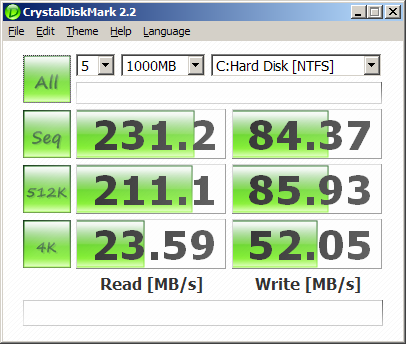
And my WD6401AALS for comparison:
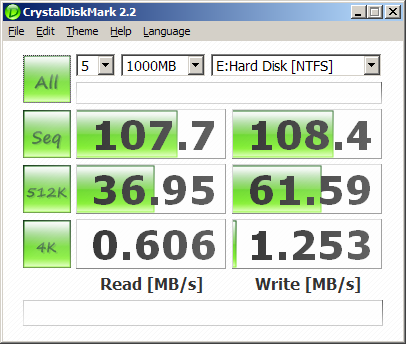
The sequential isn't that great, but the random 4K is amazing. Since your OS and many apps are often loading small random chunks of data (as opposed to a single 500MB file), the SSD will blow away a conventional HDD in those situations. Whereas the HDD's sequential might be 25% faster, the SSD's random performance is like 40x as fast (3900% faster). The small hit in sequential performance is often not noticed compared to the massive increase in random performance, assuming you're using the drive for tasks that tend to use random accesses rather than sequential.
The OCZ drives tend to be optimized for faster sequential accesses and less for random, compared to the Intel drives. They're still way better than a hard drive, just slightly different from the Intel way of doing things. Depending on exactly what you want to do with the SSD, either OCZ or Intel could be the better solution.
Here's my X25-M G2 80GB:

And my WD6401AALS for comparison:

The sequential isn't that great, but the random 4K is amazing. Since your OS and many apps are often loading small random chunks of data (as opposed to a single 500MB file), the SSD will blow away a conventional HDD in those situations. Whereas the HDD's sequential might be 25% faster, the SSD's random performance is like 40x as fast (3900% faster). The small hit in sequential performance is often not noticed compared to the massive increase in random performance, assuming you're using the drive for tasks that tend to use random accesses rather than sequential.
The OCZ drives tend to be optimized for faster sequential accesses and less for random, compared to the Intel drives. They're still way better than a hard drive, just slightly different from the Intel way of doing things. Depending on exactly what you want to do with the SSD, either OCZ or Intel could be the better solution.
You buy an SSD for IOps not for MB/s. X25-M is actually the SSD that's best at writing, while just about every SSD is good at reading.
But you need to leave go of the MB/s story; that's not relevant to your system disk only if you copy large files.
But you need to leave go of the MB/s story; that's not relevant to your system disk only if you copy large files.
You buy an SSD for IOps not for MB/s. X25-M is actually the SSD that's best at writing, while just about every SSD is good at reading.
But you need to leave go of the MB/s story; that's not relevant to your system disk only if you copy large files.
True with a pinch of salt. Again if you use a program that caches a lot of states or temporary image files then the sequential MB/s is important - in 95% of cases this is not the case and hence the SSD are far superior (or you just add a seperate scratch disk for those large seqeuntials
The sequential I/O you will see on a system disk will be sequential read, and that's fast on any SSD. Sequential write is very uncommon on system disks.
Still, the 75MB/s sequential write would let people believe the Intel is less good at writing than other SSDs, while in fact the opposite is just true.
Still, the 75MB/s sequential write would let people believe the Intel is less good at writing than other SSDs, while in fact the opposite is just true.
B/c in the real world you rarely just write purely large sequential writes.
Its kind of like buying an amplifier for your car or home stereo. You'll see people quoting 1,000 Max watts (like max sequential), etc. But those cheap amps that can do hit 1000 watts max, have a much lower Continuous (like random read/writes) wattage rating.
Where a good amplifier will quote their Continuous wattage rating (more like the random performance), and their max watts may be lower(like the Intel) but they provide a good quality signal for the whole range of performance.
Its kind of like buying an amplifier for your car or home stereo. You'll see people quoting 1,000 Max watts (like max sequential), etc. But those cheap amps that can do hit 1000 watts max, have a much lower Continuous (like random read/writes) wattage rating.
Where a good amplifier will quote their Continuous wattage rating (more like the random performance), and their max watts may be lower(like the Intel) but they provide a good quality signal for the whole range of performance.
hmm you either did not read my caveat or the original article, things like photoshop history states are large sequential writes, hdd beat the G2 by a large factor - and believe me when editing 16Bit large raw raw files you feel it. completely agree though that for most uses this is not the norm
nitrobass24
[H]ard|DCer of the Month - December 2009
- Joined
- Apr 7, 2006
- Messages
- 10,466
I bought my SSDs for sequential writes, so to say that its not relevant is just bullshit.
Damar
Supreme [H]ardness
- Joined
- Jun 20, 2004
- Messages
- 4,613
I bought my SSDs for sequential writes, so to say that its not relevant is just bullshit.
Your opinion, and if someone saying it isn't relevant is bullshit, than so is yours for saying it is.
The biggest gains from SSD's are in random reads and writes, not sequential ones, fact.
Sequential numbers are not the reason to buy an SSD right now, though that will certainly change as time goes on and controllers improve. An SSD right now can give up to 45x the random performance of a HD, but it can't do the same for the sequential numbers yet, so why would anyone waste the money paying the premium for so little gain in sequential performance?
No one with half a brain would pay a premium for little to no gain.
nitrobass24
[H]ard|DCer of the Month - December 2009
- Joined
- Apr 7, 2006
- Messages
- 10,466
Your opinion, and if someone saying it isn't relevant is bullshit, than so is yours for saying it is.
The biggest gains from SSD's are in random reads and writes, not sequential ones, fact.
Sequential numbers are not the reason to buy an SSD right now, though that will certainly change as time goes on and controllers improve. An SSD right now can give up to 45x the random performance of a HD, but it can't do the same for the sequential numbers yet, so why would anyone waste the money paying the premium for so little gain in sequential performance?
No one with half a brain would pay a premium for little to no gain.
I never said that Random was not the main selling point for most applications (boot drive), but its not nessecarily most important for every application(encoding/photoshop/etc.).
Thus its wreckless to tell somebody that its irrelevant and they should ignore it. Because for what they want to do it might be more important. I dunno i dont read minds, nor do i pretend to, so i just the present the facts as they are.
EDIT:Also on your point on paying a premium for little to no gain. Do you have a half a fucking clue what website you are on? I mean half the people here buy expensive CPU's, higher clocked ram, and OC for little to no gain.
Don't know which you bought, but if that's an Intel you're even worse off than any 5400rpm HDD.I bought my SSDs for sequential writes, so to say that its not relevant is just bullshit.
SSDs are of course so popular because they have extremely low latency; up to 100 times as fast as HDDs. But sequentially, they are 0.5-2x as fast; so sometimes even less fast. That's why sequential I/O is largely irrelevant for the SSD. And it's not needed on the system drive either; only for mass-storage.
It's not that 80GB of storage makes a good spot to save your movie collection there. Perhaps if you put 24 of them in RAID0, but doing the same with HDD would get you even higher speeds.
vista_blista
Limp Gawd
- Joined
- Jul 21, 2007
- Messages
- 480
IOPS is a good rubric to measure performance against published specs. Otherwise it's an inaccurate real world predictor in SSD desktops and pretty irrelevant. Anyone answering to the contrary might be reading the question the way Intel has trained review sites and bloggers.
Otherwise the Intel controller would be many times faster in real world applications than the next closer competitor based on 4KB writes and IOPS. But it isn't. This is coming from someone who has owned or used the Jmicron, Intel, Indilinx and Samsung-based SSD.
Especially the Indilinx and Intel controllers actually perform very similarly in booting, loading applications etc. Placing more emphasis on access time and then transfer rates better demonstrates these similarities. I do notice a difference in favor of Indilinx during large sequential writes and my simulating extremely heavy multitasking load. But I wouldn't say either is better just tuned differently.
Otherwise the Intel controller would be many times faster in real world applications than the next closer competitor based on 4KB writes and IOPS. But it isn't. This is coming from someone who has owned or used the Jmicron, Intel, Indilinx and Samsung-based SSD.
Especially the Indilinx and Intel controllers actually perform very similarly in booting, loading applications etc. Placing more emphasis on access time and then transfer rates better demonstrates these similarities. I do notice a difference in favor of Indilinx during large sequential writes and my simulating extremely heavy multitasking load. But I wouldn't say either is better just tuned differently.
Last edited:
I always thought the Intel G2 drives were the fastest. But after looking at the specs it writes only up to 70MB? That's pretty crappy compared to OCZ where its 150MB. Why do people say the Intel drives are the fastest? The reads on the OCZ by the specs anyway show that they are faster at both read and write.
Those specs are for sequential read/writes only... Which means that the OCZ drive is faster if you're installing a program or opening a large file, but that's about it. The Intel drives are faster when it comes to random read/writes w/smaller files, which accounts for most of the OS operations your system does on a daily basis. Real world they're both so much faster than regular HDD you'd be unlikely to notice the difference between 'em unless you're doing something highly specialized (that would benefit from either the greater sequential speeds or the random read/write speeds).
Newer drives like the Micron/Crucial C300 that's launching this week are actually faster under both kinds of scenarios, but it also carries a big premium ($100-ish) over equivalent 120GB OCZ drives, or at best comes out to the same as a larger (160GB) Intel drive... Though I think the MSRP is higher than that of the 160GB X25-M as well.
Aw ok so it more or less marketing BS on OCZ part...
Not necessarily, that's just the way drives have been compared up to this point... It's also the largest flashiest metric PR departments have found to showcase how much faster these drives are compared to HDD. And it's not entirely irrelevant either, if you're gonna be writing any large file frequently to your SSD then 70 MB/s vs 150MB/s+ is indeed a big difference and it's worth taking into account. If you're into content creation then taking a hit in random read/writes for better sequential speeds might be worth it. Either way they're all leaps and bounds better than a HDD.
A more impressive metric would be random access times but those are all so small that quoting them wouldn't differentiate one SSD from another (and the consumer might not even notice the huge difference between 11ms on a HDD's specs and 0.1ms on SSD specs, heh).
Especially the Indilinx and Intel controllers actually perform very similarly in booting, loading applications etc. Placing more emphasis on access time and then transfer rates better demonstrates these similarities. I do notice a difference in favor of Indilinx during large sequential writes and my simulating extremely heavy multitasking load. But I wouldn't say either is better just tuned differently.
I'd have to agree with that... IF the end-user is gonna be doing large sequential writes to his drive, then the sequential write speed advantage of the Indillix-based drives is gonna be way more noticeable than the random speed advantage the Intel drives have over it when it comes to general system responsiveness, loading apps, etc. Real world they're both so fast at that type of thing it's hard to distinguish 'em, either way they're still a nice upgrade from any HDD in that regard.
Last edited:
The rub to all this is that Intel and Indillix/OCZ and Intel prices have complimented themselves up to this point based on capacity, so for most buyers the performance difference(s) isn't even an issue since they'll just buy the largest drive they can afford. i.e. $85-100 for a 30GB Agility/Vertex AR, $120 for a 40GB Intel X25-V, $155-200 for a 60GB Solid 2/Agility/Vertex AR, $220-250 for an 80GB X25-M G2, $285-$330 for a 120GB Solid 2/Agility/Vertex AR, $425-460 for a 120GB X25-M G2...
Prices literally complement each other to fill up every possible bracket, this has been the case even a few months ago when they were higher across the board (due to high demand & price gouging on Intel drives, and the coming and going of rebates on Indillix-based drives). AFAIK the new 128GB Micron/Crucial drive is gonna go for $450-500 and it's faster than all those so the price premium is somewhat merited, and if you're in the market for their 256MB version the price is probably of no concern to you.
Prices literally complement each other to fill up every possible bracket, this has been the case even a few months ago when they were higher across the board (due to high demand & price gouging on Intel drives, and the coming and going of rebates on Indillix-based drives). AFAIK the new 128GB Micron/Crucial drive is gonna go for $450-500 and it's faster than all those so the price premium is somewhat merited, and if you're in the market for their 256MB version the price is probably of no concern to you.
These are old benches, but they do show some difference between the disks depending on benchmark. I'll post the one with the most difference; random write (very hard benchmark for SSDs):
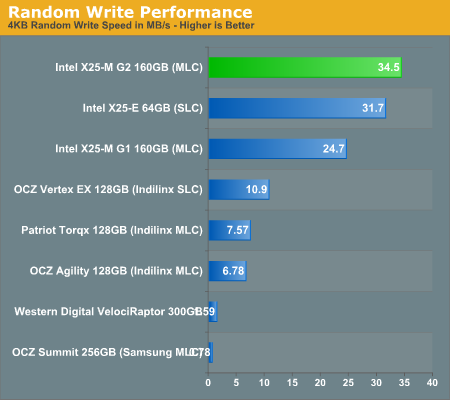
source: http://www.anandtech.com/cpuchipsets/showdoc.aspx?i=3607&p=4

source: http://www.anandtech.com/cpuchipsets/showdoc.aspx?i=3607&p=4
Pretty sure the performance of the Agility was higher on the last article Anand posted (the Vertex LE article), but I know OCZ has been playing some flash lottery w/that line as well... AFAIK the Solid 2 and Agility were both scoring over 10MB/s at random 4K writes (at 'least if you had a 120GB or larger drive, the 30GB and 60GB might've been more like 7-8MB/s).
There's obviously a difference in random read/write performance between 'em and the Intel drives tho, or even more so between either of 'em and the newest drives (C300, etc.), but regardless of that gap they're all still so much faster than a HDD... Under real world usage any of 'em would be a nice upgrade and hard to tell apart unless you're really pushing it.
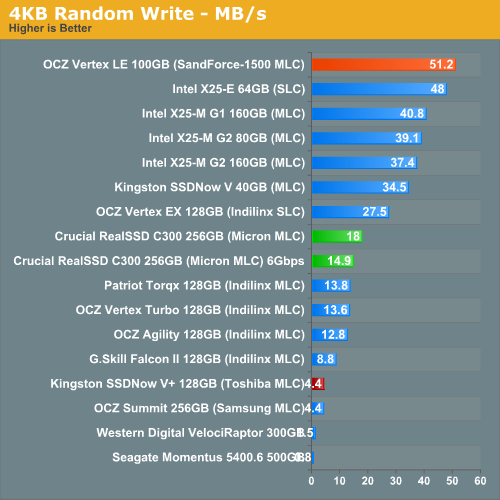
Edit: Actually, that graph is based on a mis-aligned WinXP-created partition, so they'd be a lil' higher on a properly aligned partition... The C300 and Vertex LE in particular shoot way up to over 140MB/s, the other drives would probably be within 2-5 MB/s of that graph though (and the Solid 2 would be equivalent to the Falcon II). 4K random read FWIW:
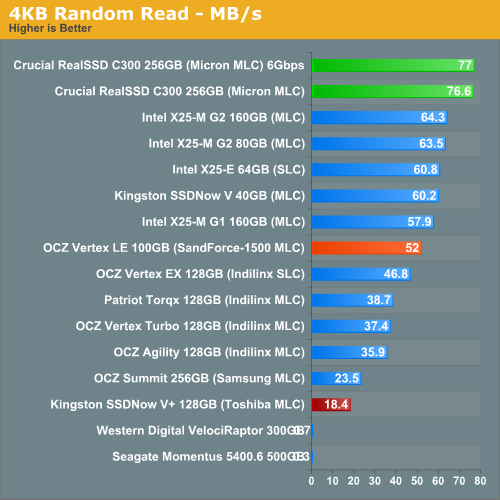
There's obviously a difference in random read/write performance between 'em and the Intel drives tho, or even more so between either of 'em and the newest drives (C300, etc.), but regardless of that gap they're all still so much faster than a HDD... Under real world usage any of 'em would be a nice upgrade and hard to tell apart unless you're really pushing it.

Edit: Actually, that graph is based on a mis-aligned WinXP-created partition, so they'd be a lil' higher on a properly aligned partition... The C300 and Vertex LE in particular shoot way up to over 140MB/s, the other drives would probably be within 2-5 MB/s of that graph though (and the Solid 2 would be equivalent to the Falcon II). 4K random read FWIW:

Last edited:
Slightly older graph but more accurate than that one of a mis-aligned partition that I posted before, just to put some more accurate Vertex/Agility numbers out there. The Falcon II (e.g. Solid 2) came out to 11.1 MB/s on this same test on the last article... Regardless of what you get, it'll be 10-100x faster than a HDD, which is kind of the point. 
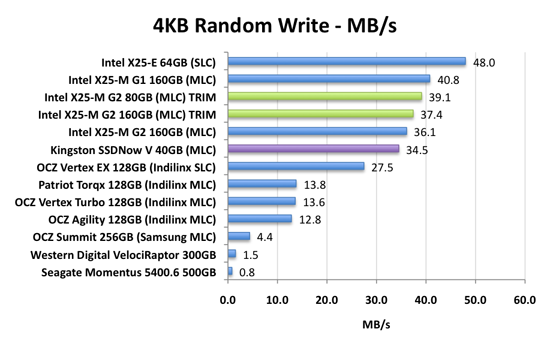

![[H]ard|Forum](/styles/hardforum/xenforo/logo_dark.png)